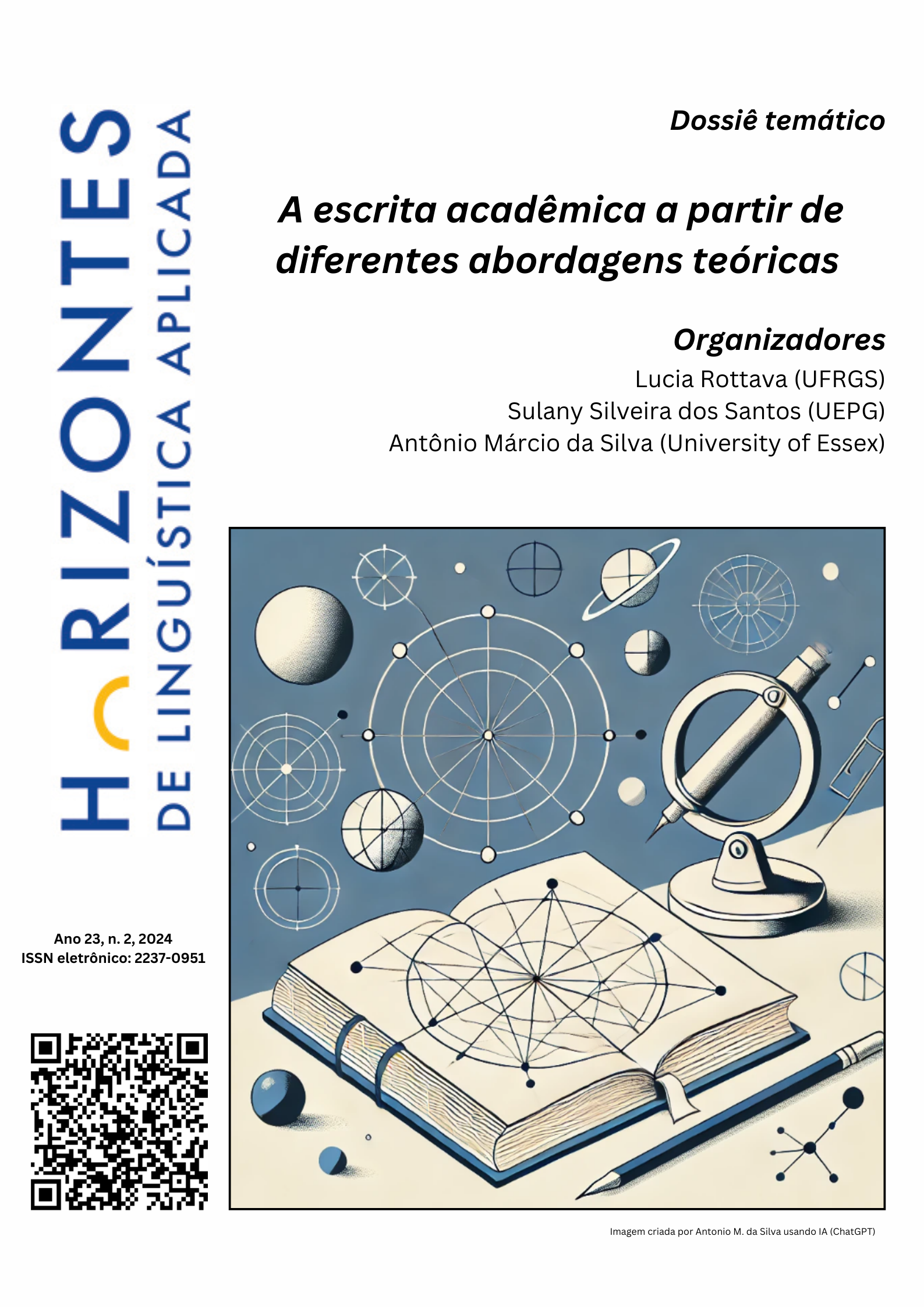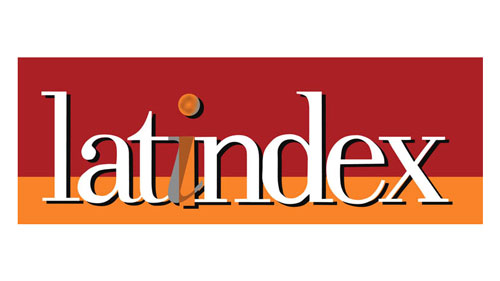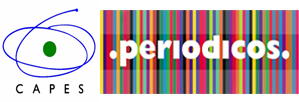Writing the future: teachers’ insights on the use of Artificial Intelligence in Foreign Language writing instruction
DOI:
https://doi.org/10.26512/rhla.v23i2.53707Keywords:
Foreign Language Teaching, Writing, Artificial Intelligence, Insights, TeachersAbstract
This study investigates the insights of Foreign Language (FL) teachers at a university regarding the use of Artificial Intelligence (AI) tools for the development of students’ writing skills. This is a descriptive survey research employing a quantitative approach, using a questionnaire for data collection. Initially, a study on the main AI tools for writing and their advantages and disadvantages was conducted. The target population are FL teachers from a university in Curitiba. Due to time constraints, a small-scale study was chosen. The questionnaire was administered in 2023, with 13 teachers responding. The results reveal differing opinions: some view AI as beneficial for students, while others believe it hinders writing. However, all agree on the importance of approaching AI cautiously. This may be attributed to potential unfamiliarity some teachers demonstrated with AI, posing an obstacle to its adoption. It is suggested that teachers and students acquire the necessary skills to use AI tools usefully, considering their increasing presence in FL classes. This entails teachers understanding how to integrate them into teaching and preparing students for a reality with AI.
Downloads
References
ALI, Z. Artificial Intelligence (AI): a review of its uses in language teaching and learning. In: INTERNATIONAL CONFERENCE ON SOFTWARE ENGINEERING & COMPUTER SYSTEMS, 6., 2019, Pehang. Iop Conference Series Annals. Pekan: Iop Conference Series, 2020. v. 769, p. 1-7. Disponível em: https://iopscience.iop.org/article/10.1088/1757-899X/769/1/012043. Acesso em: 11 jul. 2023.
CASSIDY, C. Australian universities to return to “pen and paper” exams after students caught using AI to write essays. The Guardian, 20 jan. 2023. Disponível em: https://www.theguardian.com/australia-news/2023/jan/10/universities-to-return-to-pen-and-paper-exams-after-students-caught-using-ai-to-write-essays. Acesso em: 22 set. 2023.
DUDENEY, G.; HOCKLY, N. How to: teach English with technology. Essex, UK: Pearson Education Limited, 2007.
FARRINGTON, B. AI: “Grandeur” or “Servitude”?. In: YAZDANI, M.; GELLING, R. (Ed.). Computer Assisted Language Learning. New Jersey: Ablex Publishing Corporation, 1989. p. 67-75.
FEUERRIEGEL, S. et al. Generative AI. Business & Information Systems Engineering, p. 111-126, fev. 2024.
FRANCO, M. Três em cada 10 alunos já usaram inteligência artificial, diz pesquisa do Google: levantamento mostra que 70% dos estudantes brasileiros já ouviram falar de IA e 73% querem mais tecnologia na escola. Folha de S.Paulo, 2023. Disponível em: https://www1.folha.uol.com.br/folhateen/2023/07/tres-em-cada-dez-alunos-ja-usaram-inteligencia-artificial-diz-pesquisa-do-google.shtml. Acesso em: 20 jul. 2024.
KELLER, L.; HENRIQUES, M. (Org.). Devemos temer o uso da Inteligência Artificial na educação?: Docentes da UFSM avaliam como as novas tecnologias podem impactar o ensino brasileiro. UFSM: Universidade Federal de Santa Maria, 16 jun. 2023. Disponível em: https://www.ufsm.br/2023/06/13/uso-da-inteligencia-artificial-na-educacao. Acesso em: 11 set. 2023.
KIM, N.J.; KIM, M.K. Teacher’s perceptions of using an artificial intelligence-based educational tool for scientific writing. Frontiers In Education, v. 7, n. 2, p. 537-550, 29 mar. 2022. Disponível em: https://www.frontiersin.org/articles/10.3389/feduc.2022.755914/full. Acesso em: 03 set. 2023.
KOHNKE, L.; MOORHOUSE, B.L; ZOU, D. ChatGPT for language teaching and learning. Relc Journal, Singapore, v. 54, n. 2, p. 537-550, 03 set. 2023. Disponível em: https://journals.sagepub.com/doi/10.1177/00336882231162868. Acesso em: 19 set. 2023.
LEITE, L. S. et al. Tecnologia educacional: descubra suas possibilidades na sala de aula. Petrópolis, RJ: Vozes, 2003.
MAGALHÃES, A. L.; CIRIACO, D. (Ed.). O que são prompts no ChatGPT? Canal Tech, 2024. Disponível em: https://canaltech.com.br/apps/o-que-sao-prompts-no-chatgpt/. Acesso em: 20 abr. 2024.
MARQUES, E. Inteligência Artificial para escrever textos: como a ia está transformando a escrita. Como a IA está transformando a escrita. Awari, 20 jul. 2023. Disponível em: https://awari.com.br/inteligencia-artificial-para-escrever-textos-como-a-ia-esta-transformando-a-escrita/?utm_source=blog&utm_campaign=projeto+blog&utm_medium=Intelig%C3%AAncia%20Artificial%20para%20Escrever%20Textos:%20Como%20a%20IA%20Est%C3%A1%20Transformando%20a%20Escrita. Acesso em: 9 out. 2023.
MOREIRA, H.; CALEFFE, L.G. Metodologia da pesquisa para o professor pesquisador. Rio de Janeiro: DP&A, 2006.
MOREIRA, H. Motivation profiles of physical education teachers. 1995. 221 f. Tese (Doutorado em Educação) – University of Exeter, Exeter, Great Britain, 1995.
PARREIRA, A.; LEHMANN, L.; OLIVEIRA, M. O desafio das tecnologias de inteligência artificial na Educação: percepção e avaliação dos professores. Ensaio: Avaliação e Políticas Públicas em Educação, v. 29, n. 113, p. 975-999, out. 2021. Disponível em: https://www.scielo.br/j/ensaio/a/nM9Rk8swvtDvwWNrKCZtjGn/?lang=pt#. Acesso em: 13 set. 2023.
POKRIVCAKOVA, S. Preparing teachers for the application of AI-powered technologies in foreign language education. Journal of Language and Cultural Education, Warsaw, v. 7, n. 3, p. 135-153, 25 dez. 2019. Disponível em: https://sciendo.com/article/10.2478/jolace-2019-0025. Acesso em: 13 set. 2023.
RUSSEL, S.; NORVING, P. Artificial Language: a modern approach. New Jersey: Prentice-Hall, 1995.
SCHMIDT, T.; STRASSER, T. Artificial Intelligence in Foreign Language Learning and Teaching. Anglistik, Heidelberg, v. 33, n. 1, p. 165-184, 2022. Disponível em: https://www.researchgate.net/publication/360929120_Artificial_Intelligence_in_Foreign_Language_Learning_and_Teaching_A_CALL_for_Intelligent_Practice. Acesso em: 25 abr. 2024.
SCHULZE, M.; HEIFT, T. Intelligent CALL. In: THOMAS, M.; REINDERS, H.; WARSCHAUER, M. (Ed.). Contemporary Computer-Assisted Language Learning. London: Bloomsbury Academic, 2012. p. 249-265.
SENTANCE, S. Recognising and responding to English article usage errors: an ICALL based approach. 1993. 346 f. Tese (Doutorado em Filosofia) - Curso de Phd Doctor Of Philosophy, University of Edinburgh, Edinburgh, 1993. Disponível em: https://era.ed.ac.uk/handle/1842/20176. Acesso em: 02 out. 2023.
STOCKWELL, G. Mobile assisted language learning: concepts, contexts and challenges. Cambridge, Mass: Cambridge University Press, 2022.
TEGMARK, M. Vida 3.0: o ser humano na era da inteligência artificial. Trad. Petê Rissatti. São Paulo: Benvirá, 2020.
TREDINNICK, L.; LAYBATS, C. The dangers of generative artificial intelligence. Business Information Review, v. 40, n. 2, p. 46-248, jun. 2023. Disponível em: https://journals.sagepub.com/doi/10.1177/02663821231183756. Acesso em: 25 abr. 2024.
TURING, A. M. Computer machinery and intelligence. Mind: New Series, Oxford, v. 59, n. 236, p. 433-460, Out. 1950. Disponível em: https://redirect.cs.umbc.edu/courses/471/papers/turing.pdf. Acesso em: 29 jul. 2023.
YANG, M. New York City schools ban AI chatbot that writes essays and answers prompts. The Guardian, 6 jan. 2023. Disponível em: https://www.theguardian.com/us-news/2023/jan/06/new-york-city-schools-ban-ai-chatbot-chatgpt. Acesso em: 27 abr. 2024.
YANHUA, Z. The Application of Artificial Intelligence in Foreign Language Teaching. In: INTERNATIONAL CONFERENCE ON ARTIFICIAL INTELLIGENCE AND EDUCATION (ICAIE), 21., 2020, Tianjin. Anal. [S.l.]: Institute Of Electrical And Electronics Engineers, 2020. p. 40-42.
Downloads
Published
How to Cite
Issue
Section
License
Copyright (c) 2024 Revista Horizontes de Linguistica Aplicada

This work is licensed under a Creative Commons Attribution-NonCommercial-NoDerivatives 4.0 International License.
Articles published by the Journal Horizontes de Linguística Aplicada are licensed under a Creative Commons Attribution-NonCommercial-NoDerivatives 4.0 International License.
By publishing in Horizontes de Linguística Aplicada, authors agree to the transfer of economic copyright to the journal. Authors retain their moral rights, including the right to be recognized as the creators of the work.
Authors and readers are free to:
Share — copy and redistribute the material in any medium or format
Under the following terms:
- Attribution — You must give appropriate credit , provide a link to the license, and indicate if changes were made . You may do so in any reasonable manner, but not in any way that suggests the licensor endorses you or your use.
- NonCommercial — You may not use the material for commercial purposes .
- NoDerivatives — If you remix, transform, or build upon the material, you may not distribute the modified material.
- No additional restrictions — You may not apply legal terms or technological measures that legally restrict others from doing anything the license permits.






